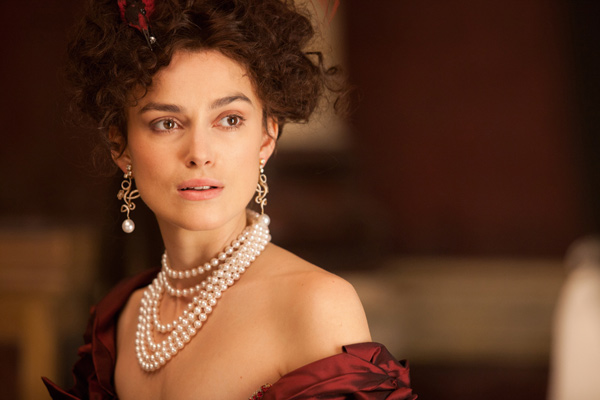Joe Wright’s adaptation of Anna Karenina is so bold and audacious its bold audacity becomes the story, rather than the actual story itself. This is both a strength — it is always visually dazzling, inventive and surprising — and a weakness, as it is so goddamn distracting. The entire action, more or less, is set in an old decaying theatre beneath a proscenium arch with its own backstage, balconies and rat runs, and an origami-ish ability to fold in on itself, or fold out on itself to become ballroom or bedroom, and even horse-race track. According to Wright, this makes sense as high society in Tsarist Russia was all about performance, and fakery — their whole world was truly a stage — but it is also mise en scène gone totally mental. Whether you will like this Anna will, I think, depend on whether you can admire such imagination at the expense of what this film lacks: true feeling.
Although the set is the star of this film, along with the magnificently silky confections that are the frocks, the actors do well enough, in the circumstances. This is Wright’s third outing with his favourite leading lady, Keira Knightley (she also starred in his Atonement and Pride and Prejudice), and although the poor old thing always gets it in the neck (she acts with her teeth, is the general complaint), she is a luminous Anna. The camera loves her, whatever, and she raises her game here. No one in Tolstoy’s great, sweeping epic is one thing or the other. They are all emotionally complex, and Miss Knightley’s Anna is alternately noble and ridiculous, humble and haughty, spirited and dispirited, admirable and irritating. Her hair also goes from fabulously coiffured to scarily witchy, which is also an interesting journey to follow. Meanwhile, her buttoned-up, passionless husband, Karenin, is played with some dignity by Jude Law who, it transpires, is far better at balding non-romantic leads than he is at romantic leads pretending they are not going bald. I don’t feel the need to rehash the plot here — I’m assuming most of you know it — but do, of course, have to say that Vronsky, although the most limited character, as he cannot see beyond his immediate wants, must pack a punch, which Aaron Taylor-Johnson fails to deliver. He seems like a boy sent to do a man’s job, particularly as he’s been awarded blond curls as a hairdo, for some reason. I would not leave Karenin for him. I probably wouldn’t even leave my tea to get cold for him. Just saying.
Obviously, the novel had to be reduced from its doorstop proportions so Tom Stoppard, who wrote the script, focuses solely on the love elements. This means not just Anna and Vronsky, but also, running in parallel, the story of Levin (Domhnall Gleeson) and Kitty (Alicia Vikander). Levin is the country landowner whose first proposal to Kitty, Anna’s brother’s sister-in-law, is clumsily declined as she is also infatuated with Vronsky. Whenever Levin returns to his estate from either Moscow or St Petersburg, he exits a theatre door and steps immediately into a vast snowy landscape, or a vast non-snowy landscape golden with corn. I guess Wright is saying that, on returning to the land, he is leaving all the fakery behind him, and becoming something more real. But need he tell us so many times? I think it’s three or four at least. It’s as if Wright can’t let a scene go without grabbing attention for his own direction. I felt sorriest for poor Levin when, out scything with his peasants, they perform in such a highly stylised and choreographed manner it’s as if they are Pan’s People appearing on Top of the Pops.
The metaphors are abundant — every time Anna is faced with indecision, a train noisily grinds to a halt — and the soundtrack is startling as knuckles crack, knees creak, horses’ hooves pound. Trouble is, you are never left alone, for a minute, to feel or engage. When Karenin refuses to allow Anna to see their son? Nothing. When Anna realises Vronsky is losing interest? Nothing. When Anna starts hitting the laudanum. Nothing. Wright has said he did not wish to make ‘yet another period drama’, and he’s achieved this, has explored something new, but at an emotional cost. Worth paying? Like I said, up to you.






Comments